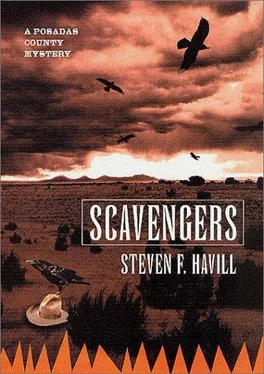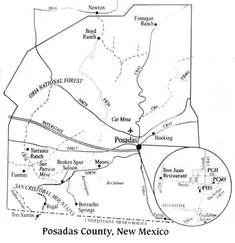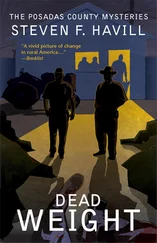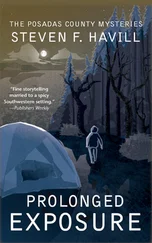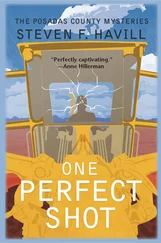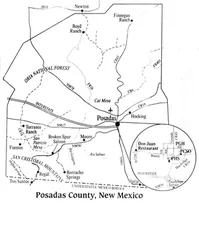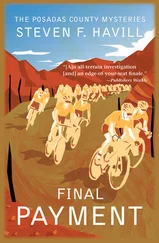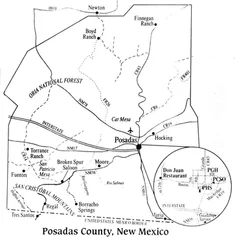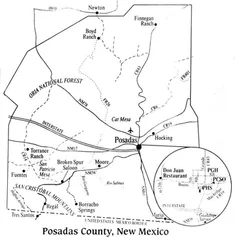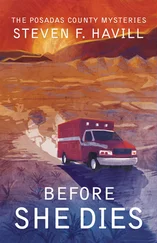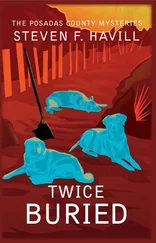Steven Havill - Scavengers
Здесь есть возможность читать онлайн «Steven Havill - Scavengers» весь текст электронной книги совершенно бесплатно (целиком полную версию без сокращений). В некоторых случаях можно слушать аудио, скачать через торрент в формате fb2 и присутствует краткое содержание. Год выпуска: 2002, ISBN: 2002, Издательство: Minotaur Books, Жанр: Полицейский детектив, на английском языке. Описание произведения, (предисловие) а так же отзывы посетителей доступны на портале библиотеки ЛибКат.
- Название:Scavengers
- Автор:
- Издательство:Minotaur Books
- Жанр:
- Год:2002
- ISBN:9780312288334
- Рейтинг книги:3 / 5. Голосов: 1
-
Избранное:Добавить в избранное
- Отзывы:
-
Ваша оценка:
- 60
- 1
- 2
- 3
- 4
- 5
Scavengers: краткое содержание, описание и аннотация
Предлагаем к чтению аннотацию, описание, краткое содержание или предисловие (зависит от того, что написал сам автор книги «Scavengers»). Если вы не нашли необходимую информацию о книге — напишите в комментариях, мы постараемся отыскать её.
Scavengers — читать онлайн бесплатно полную книгу (весь текст) целиком
Ниже представлен текст книги, разбитый по страницам. Система сохранения места последней прочитанной страницы, позволяет с удобством читать онлайн бесплатно книгу «Scavengers», без необходимости каждый раз заново искать на чём Вы остановились. Поставьте закладку, и сможете в любой момент перейти на страницу, на которой закончили чтение.
Интервал:
Закладка:
“You’ve got your phone?”
“Yes, I do. And it’s switched off.” She grinned. “I’ll call you…don’t call me.” She didn’t take time to explain to the deputy why she didn’t want to make the call to Naranjo herself. It was the same stretch of desert, after all…the arbitrary line in the gravel that marked the end of one country and the beginning of another meant nothing to the rocks and plants and critters that lived here-or to the signals from her cellular phone. As she moved steadily south-even though only by a few feet-she wanted to concentrate on every sound, every waft of air, every smell that the Mexican desert had to offer. The last thing she wanted, when she needed absolute silence, was the sudden, jarring warble of the telephone.
CHAPTER THIRTY-THREE
Estelle Reyes-Guzman was able to follow the traces of Eurelio Saenz’s tortured crawl for what she estimated was well over two hundred yards before the relatively level desert gave way to a rumple in its complexion. An arroyo swept in from the northwest, cut when a small rivulet started off the flank of the hill just southwest of where the undersheriff’s car was parked.
Standing on the arroyo’s edge, Estelle swung the light to play on the tracks. The arroyo bottom a dozen feet below was cut by another small channel from the most recent rains-a month, two months, maybe six months before. A few deep pockmarks where cattle had stepped caught the light.
When Eurelio had crossed the arroyo, he had been staggering, but he’d been on his feet. He hadn’t crawled across like a wounded lizard. The arroyo bottom was at least fifty feet wide, maybe sixty. The harsh beam of the flashlight made it difficult to judge. The shoeprints meandered like those of a drunken man.
He had reached the northeast side and then had been faced with an arroyo bank of eroded gravel that was twice as tall as he was-an impossible barrier for a man who could hardly walk, and probably could not see.
Estelle stepped as near the edge as she dared and turned the light downward. The tracks turned to parallel the arroyo side, running up a smooth wash of quartz sand. Estelle could picture the young man, one arm out against the rough bank for balance, trying to maneuver his way in the dark, desperate almost to madness from the pain.
Cattle were adept at finding their way down into and up out of arroyos. Once they discovered an easy route, that became their thoroughfare, hooves cutting the trail deep and hard. Eurelio Saenz had stumbled along the arroyo for almost fifty feet before he came upon the cattle trail that would save his life. The trail cut diagonally up the bank, up and out to the desert beyond.
Before descending into the arroyo, Estelle stood and listened. She hadn’t heard Jackie Taber’s county unit accelerate away, but the sound could easily be lost in the rolling hills. She looked up at the vast heavens. A full moon would have been helpful, rather than the little silver remnant that was already fading just above the eastern horizon.
Picking her way slowly, Estelle descended into the arroyo. Mingled with the tracks were copious blood spatters. She followed the tracks across, but even from the midpoint of the arroyo, still twenty or thirty feet from the other side, she saw that there was no matching cattle trail on the other side. Still, the footprints staggered from a spot directly ahead. She reached the southwest side of the arroyo and stopped. The edge above her head was crumbled, some of the edge freshly knocked loose.
On the arroyo floor was a series of imprints, a hodgepodge of impressions. No one had scrabbled down the arroyo side. The loose edge and churned gravel below indicated that at least one person had plunged into the arroyo from above. For several minutes, Estelle stood quietly, working the flashlight over every inch.
Had Eurelio Saenz cringed at the edge of the arroyo above, beaten and barely conscious, caught in the glare of flashlights, until a bullet had bowled him over the side? Had he been unceremoniously kicked over as he lay unconscious and bleeding?
Whatever the circumstances, the thugs had chosen a prime spot-out of sight of the highway, the border fence, any curious, prying eyes. A spring rain would shift and mold the contours of the arroyo bottom, hiding the few bones that coyotes, ravens, and vultures left behind.
Eurelio Saenz had fooled them. His attackers had been convinced that the young man was dead, Estelle was sure. They had taken the time to bury Rafael Smith, but Lolo Duarte had made them angry, and they’d left his corpse for the vultures. Apparently, Eurelio Saenz had made them angry, too.
With no way to leap up and out of the arroyo at that point, Estelle swung her light southeast, following the watercourse. The arroyo ran straight for fifty yards before sweeping around a corner. Estelle walked in that direction, staying on the ground beaten by cattle hooves. Just around the corner, she found a slump in the arroyo bank, and the trail led up on a long diagonal. She climbed out quickly, then turned to walk back along the rim.
She approached the spot above Eurelio’s plunge with care. The vegetation was scant, dotted across the rugged desert, clustered here and there where there was shade or a natural water catchment.
It was the tire tracks that caught the flashlight beam first as she swept it back and forth. A rough cut in the desert, dodging the runty clusters of acacia and cholla, was marked by the occasional passage of vehicles-a rancher, shepherd, hunter, or rock hound, maybe a dozen in a banner year. Still, that was enough to make a permanent scar in the desert. The two-track had to meander eventually toward the main road from Tres Santos to Asunción.
Estelle stood and listened, wishing she was high over the desert in Jim Bergin’s plane. She would be able to understand at a glance the spiderweb of trails and paths. Perhaps the path in front of her was the only thoroughfare in this area. If so, it must wind within shouting distance of the border fence behind the village of Maria, perhaps only a few thousand yards from where Estelle stood.
She stepped as if in slow motion, playing the light under every bush or clump of bunch grass. Twenty feet from the arroyo edge, she found the azote del espinos . Except for the pale gleam of the handle, it might easily have been a cactus somehow uprooted by an energetic Mexican steer, eager to tussle something with its sharp horns, not minding a few spines in the process. Estelle felt her pulse pounding in her ears. The cholla was the better part of four feet long, with three heavy branches forking off the main stem, each with its own clusters of branches. The limbs were broken and twisted, the spines bent and torn-or missing.
Reaching carefully, Estelle picked up the azote by the base, where several swipes of a machete or large knife had cleaned off the threatening thorns. Even with much of it broken away, the remains of the cholla bush weighed five or six pounds, a stout, vicious weapon.
She bent and laid the cactus fragment on the ground. After the last stroke, the thugs would have tossed the azote to one side, but it was heavy and awkward-it wouldn’t go far. And sure enough, less than five paces farther on, she found the trampled ground where Eurelio had fought his attackers and lost.
Estelle stood rooted. How had they held him? An incapacitating, unexpected blow first? Or had they shot him, and then seen that he was still alive. The torn desert extended in a radius of several feet, as if the man wielding the whip had followed his target as Eurelio tried to scramble first one way and then another, frantic to avoid the lashing spikes of the cactus. Had they tied his hands behind his back? A rope around the neck like a dog?
A sharp pain in her left hand brought her back. She had been clenching her fist so hard that a fingernail had cut the palm.
Читать дальшеИнтервал:
Закладка:
Похожие книги на «Scavengers»
Представляем Вашему вниманию похожие книги на «Scavengers» списком для выбора. Мы отобрали схожую по названию и смыслу литературу в надежде предоставить читателям больше вариантов отыскать новые, интересные, ещё непрочитанные произведения.
Обсуждение, отзывы о книге «Scavengers» и просто собственные мнения читателей. Оставьте ваши комментарии, напишите, что Вы думаете о произведении, его смысле или главных героях. Укажите что конкретно понравилось, а что нет, и почему Вы так считаете.
